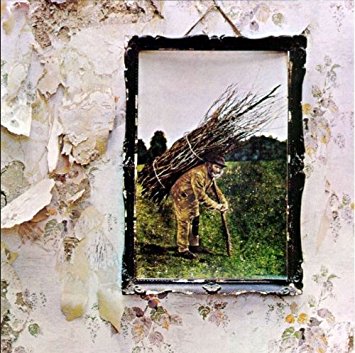
Led Zeppelin IV (1971)

1. Black Dock
2. Rock and Roll
3. The Battle of Evermore
4. Stairway to Heaven
5. Misty Mountain Hop
6. Four Sticks
7. Going to California
8. When the Levee Breaks
It is, by any standard, one of the most iconic and best-selling rock albums of all time—and it doesn’t even have a name. Commonly referred to as Led Zeppelin IV (or, depending on your vinyl sleeve, “the one with the symbols”), this nameless release arrived in 1971 cloaked in deliberate ambiguity. It was, allegedly, the band’s curt response to the lukewarm critical reception of Led Zeppelin III. How a refusal to title an album translates into critical retribution remains unclear, but one suspects Zeppelin were less concerned with logic than with myth-making. Mission accomplished.
No matter the title, this is a masterclass in ambition, cohesion, and musical versatility. If III had suggested they were capable of stylistic breadth, then IV confirmed it—without apology, and without compromise. Every track here sounds like it’s been forged in fire and polished to a shine. It is, in every sense, the band’s most accessible album and also, arguably, their most expansive.
Let’s address the monolith in the room: Stairway to Heaven. It has become the burden of its own brilliance. A cultural landmark so overplayed that it now exists as a parody of itself—referenced, mocked, adored, and avoided in equal measure. Even Robert Plant has confessed to his own discomfort with it, which is a bit like Michelangelo growing tired of the Sistine Chapel. But approached with fresh ears—ideally through the album itself and not via some crusty FM radio edit—one is reminded why this song mattered so much in the first place. It doesn’t need explaining; it needs rediscovery.
But to focus solely on Stairway is to miss the depth of the surrounding material. The album opens with a thunderous double blow: Black Dog and Rock and Roll, both swaggering, riff-heavy rockers that share a rhythmic looseness and an irresistible bravado. It’s difficult to even think of one without the other—they feel like siblings born of the same jam session, and indeed, they were issued as singles, forever linked in the public’s mind.
Misty Mountain Hop dials the tempo back slightly, but remains a solid groove, driven by John Paul Jones’s underrated keyboard work, which lifts the track into an almost psychedelic swirl. Four Sticks, while less immediate, has an addictive thud-thump rhythm built on Bonham’s double-sticked experimentation. It’s arguably a touch overlong and repetitive, but in the context of this record, such a minor indulgence is forgivable.
On the softer side, Going to California may well be the band’s most graceful acoustic piece. Fragile and heartfelt, it sidesteps the band’s usual bluster and instead delivers something genuinely tender. It’s the counterpoint to the ominous blues of When the Levee Breaks, the album’s closer, where Bonham’s drums—recorded in a stairwell for maximum impact—sound like the end of the world. Few rock songs have ever sounded this heavy without becoming sludge. It’s blues, yes, but blues as filtered through an apocalyptic lens.
Somewhere between those extremes lies The Battle of Evermore, an eerie, folk-laden duet with Sandy Denny that seems ripped from the pages of Tolkien. It’s whimsical and otherworldly in equal measure—another reminder that Zeppelin could convincingly dabble in English folklore as easily as they could Detroit grit.
Led Zeppelin IV was, for many, the gateway drug—the first album they purchased, the first step into the band’s larger universe. Ironically, some longtime fans don’t even consider it their finest work. And yet, that’s the magic of it. For all the weight carried by Stairway To Heaven, there’s so much more on offer. Every track here is its own world, and each one serves as a potent reminder: this band was never about one song. It was always about the journey.
Go back to the main page
Go To Next Review